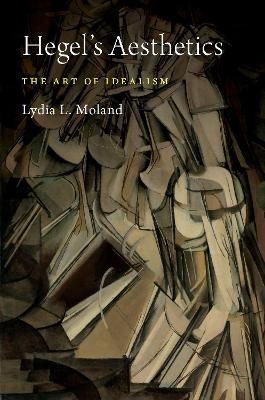
Hegel's Aesthetics
Oxford University Press Inc (Verlag)
978-0-19-084732-6 (ISBN)
Hegel is known as "the father of art history," yet recent scholarship has overlooked his contributions. This is the first comprehensive interpretation of Hegel's philosophy of art in English in thirty years. In a new analysis of Hegel's notorious "end of art" thesis, Hegel's Aesthetics shows the indispensability of Hegel's aesthetics for understanding his philosophical idealism and introduces a new claim about his account of aesthetic experience.
In a departure from previous interpretations, Lydia Moland argues for considering Hegel's discussion of individual arts--architecture, sculpture, painting, music, and poetry--on their own terms, unlocking new insights about his theories of perception, feeling, selfhood, and freedom. This new approach allows Hegel's philosophy to engage with modern aesthetic theories and opens new possibilities for applying Hegel's aesthetics to contemporary art. Moland further elucidates his controversial analysis of symbolic, classical, and romantic art through clarifying Hegel's examples of each. By incorporating newly available sources from Hegel's lectures on art, this book widely expands our understanding of the particular artworks Hegel discusses as well as the theories he rejects. Hegel's Aesthetics further situates his arguments in the intense philosophizing about art among his contemporaries, including Kant, Lessing, Herder, Schelling, and the Schlegel brothers.
Ultimately, the book offers a rich vision of the foundation of his ideas about art and the range of their application, confirming Hegel as one of the most important theorists of art in the history of philosophy.
Lydia Moland is Associate Professor of Philosophy at Colby College. She is the author of Hegel on Political Identity (Northwestern University Press, 2011) and the editor of All Too Human: Laughter, Humor, and Comedy in Nineteenth-Century Philosophy (Springer, 2018). She has published articles on Hegel's political and aesthetic philosophy, the playwright and philosopher Friedrich Schiller, and the American abolitionist Lydia Maria Child. She is the recipient of grants from the NEH, the ACLS, and the American Academy in Berlin.
Introduction
Part I: Art and the Idea
Chapter One: Truth and Beauty: Art as the Sensuous Appearance of the Idea
Part II: The Particular Forms of Art
Chapter Two: Symbolic Art: The Distant Divine
Chapter Three: Classical Art: The Embodied Divine
Chapter Four: Romantic Art: The Human Divine
Chapter Five: The Dissolution and Future of the Particular Arts
Part III: The System of the Individual Arts
Chapter Six: Externality as Symbol: Architecture
Chapter Seven: Individuality Embodied: Sculpture
Chapter Eight: Subjectivity in Retreat: Painting
Chapter Nine: The Sound of Feeling: Music
Chapter Ten: The Language of Inner Imagination: Poetry
Chapter Eleven: Embodied Reconciliation: Poetic Subgenres and the End of the Individual Arts
Conclusion
| Erscheinungsdatum | 29.07.2019 |
|---|---|
| Zusatzinfo | 15 color |
| Verlagsort | New York |
| Sprache | englisch |
| Maße | 145 x 211 mm |
| Gewicht | 499 g |
| Themenwelt | Geisteswissenschaften ► Philosophie ► Geschichte der Philosophie |
| Geisteswissenschaften ► Philosophie ► Philosophie der Neuzeit | |
| ISBN-10 | 0-19-084732-8 / 0190847328 |
| ISBN-13 | 978-0-19-084732-6 / 9780190847326 |
| Zustand | Neuware |
| Haben Sie eine Frage zum Produkt? |
aus dem Bereich


